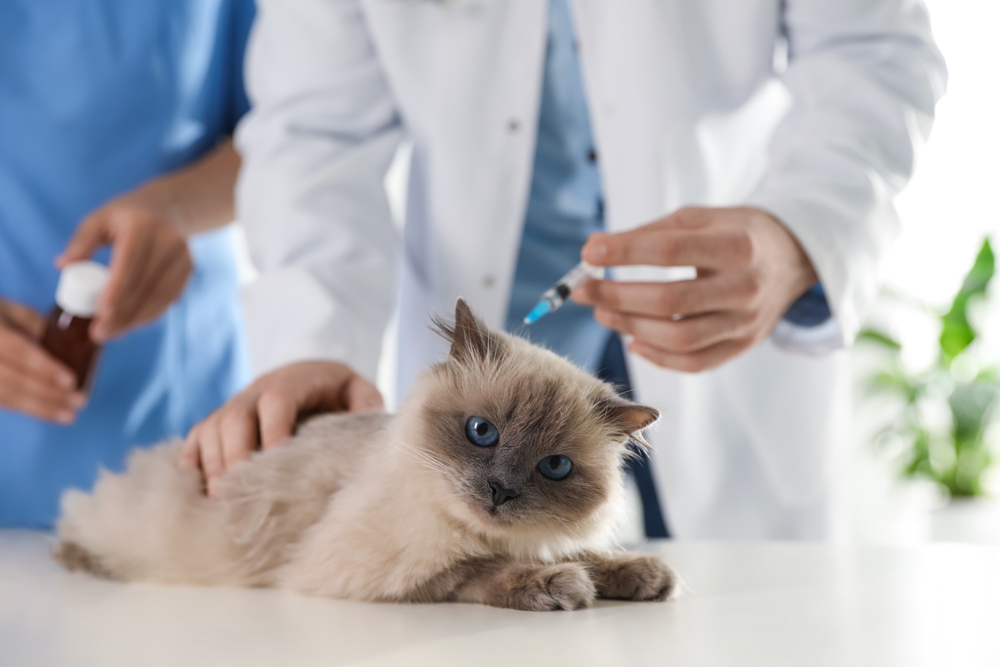How Vaccines Protect Pets in Everyday Life
A puppy sniffing where a raccoon passed by, a cat watching strays from the patio, or a friendly dog sharing water at the park- these everyday moments may seem harmless but can expose pets to dangerous diseases. Vaccines work quietly in the background, preparing your pet’s immune system to fight off infection before illness develops.
At Memorial Villages Animal Hospital in Houston, TX, every vaccination plan is personalized. Pets receive comprehensive protection as part of a complete wellness strategy that adapts to their age, health, and lifestyle.
Why Vaccines Are Essential for Pet Health
How Vaccines Work
Vaccines train the immune system to recognize and neutralize viruses or bacteria before they cause disease. Once vaccinated, a pet’s immune system “remembers” the pathogen, responding quickly if exposure occurs again.
This process doesn’t just protect individual pets- it supports community immunity. When most pets are vaccinated, disease transmission drops, helping protect animals who are too young, old, or ill to receive vaccines. Learn more about how vaccines protect pets and their proven benefits across decades of veterinary research.
The Risks of Skipping Vaccines
Delaying or skipping vaccines leaves pets vulnerable to preventable illnesses. Canine parvovirus can kill puppies within days, and rabies is nearly always fatal once symptoms appear. Feline leukemia virus remains a leading cause of cancer and immune suppression in cats.
Side effects from vaccines are rare and typically mild- brief soreness, fatigue, or decreased appetite for a day or two. Veterinarians always assess each pet’s health before vaccinating to ensure a safe, effective protocol tailored to their needs.
Core Vaccines: The Foundation of Protection
Core Vaccines for Dogs
Core vaccines are considered essential for all dogs, regardless of lifestyle, because they protect against severe and widespread diseases:
- Rabies: Required by law in Texas and critical for public safety. Rabies prevention guidance underscores that vaccination is the only reliable defense.
- Distemper: A highly contagious viral disease that affects the respiratory, gastrointestinal, and nervous systems. Canine distemper vaccination is the most effective protection.
- Parvovirus: Causes severe gastrointestinal illness and dehydration, particularly in puppies. The virus can survive for months in the environment, making vaccination essential.
- Adenovirus (Hepatitis): Protects against a viral liver infection that can cause fever, abdominal pain, and organ damage.
- Leptospirosis: Now classified as a core vaccine for all dogs. It prevents a bacterial infection spread through water or soil contaminated by wildlife urine and protects both pets and people from serious kidney and liver disease.
Core Vaccines for Cats
Cats benefit from the following core vaccines that protect against highly contagious and often deadly diseases:
- Rabies: Required in most states, including Texas. Even indoor cats are at risk from bats or accidental escapes.
- FVRCP (Viral Rhinotracheitis, Calicivirus, and Panleukopenia): Guards against respiratory infections, fever, and gastrointestinal illness that can spread rapidly- even indoors.
- Feline Leukemia Virus (FeLV): Core for all cats under one year old. The virus spreads through close contact, grooming, and shared food bowls, causing immune suppression and cancer. Early vaccination ensures lasting protection before potential exposure.
Lifestyle Vaccines: Tailored to Your Pet’s Environment
Non-core vaccines are recommended based on lifestyle, exposure risk, and regional disease patterns. They add an extra layer of protection for pets with specific environmental or social exposures.
Dogs:
- Lyme Disease: Protects dogs in tick-heavy areas from infection that can cause joint pain, fever, and kidney complications.
- Canine Influenza: Recommended for dogs that visit boarding, daycare, or grooming facilities. Prevents contagious flu-like illness and secondary infections.
- Kennel Cough: Helps prevent persistent coughing caused by respiratory pathogens common in group settings.
Cats:
- Bordetella bronchiseptica: Recommended for cats in multi-cat households, shelters, or boarding environments. Helps prevent contagious respiratory infections and chronic respiratory illness.
- FeLV (continued boosters): For adult cats who go outdoors or live with other cats, maintaining FeLV protection reduces cancer and immune system risks.
Vaccination Schedules for Every Life Stage
Puppies and Kittens: Building Immunity Early
Young animals begin vaccinations between 6–8 weeks of age, with boosters every 3–4 weeks until 16–20 weeks. These initial series close the gap as maternal antibodies fade, creating long-term immunity.
Dog life stages and cat life stages illustrate how early care- including vaccination, parasite prevention, and nutrition- lays the groundwork for lifelong health.
Adult Pets: Maintaining Consistent Protection
After completing their initial series, adult pets need regular boosters to sustain immunity. Core vaccines are typically updated every one to three years, while lifestyle vaccines may require annual administration.
Regular veterinary visits help ensure schedules remain accurate and give veterinarians a chance to assess any health or lifestyle changes that may affect vaccination plans.
Senior Pets: Adapting to Aging Health
Older pets often need customized vaccination plans. Immune function naturally declines with age, making core vaccines as important as ever, though schedules may be modified for pets with chronic conditions. Memorial Villages Animal Hospital offers senior pet services that balance comfort and safety while preserving vital immunity.
Houston’s Climate and Local Disease Risks
Houston’s warm, humid climate makes preventive care especially important. Frequent rain creates standing water where leptospirosis bacteria thrive, and mosquitoes capable of transmitting heartworm remain active year-round.
Urban wildlife- including raccoons, skunks, and bats- also increases rabies exposure risk. Memorial Villages Animal Hospital helps local families stay proactive with low-cost vaccine clinics designed to keep essential care affordable and accessible for every pet.
Common Pet Vaccination Questions
Are Vaccines Safe?
Yes. Modern vaccines undergo extensive safety testing and continuous monitoring. Serious reactions are extremely rare, and mild fatigue or appetite changes typically resolve within 24–48 hours.
Can My Pet Get Rabies Even if Vaccinated?
Vaccine failure is extraordinarily uncommon. When booster schedules are followed, pets remain protected. Can my pet get rabies? explains how vaccination nearly eliminates risk for both pets and families.
Why Choose Memorial Villages Animal Hospital?
At Memorial Villages Animal Hospital, vaccination is part of a larger commitment to total wellness. Each appointment includes a full physical exam, health history review, and vaccine plan based on your pet’s lifestyle and environment.
The hospital’s comprehensive services integrate diagnostics, dental care, and preventive medicine in one trusted location- so you can manage all aspects of your pet’s care seamlessly and confidently.

Protecting Your Pet’s Future Health
Vaccination is one of the simplest and most effective ways to protect your pet’s health for years to come. Whether you’re welcoming a new puppy or kitten, maintaining an adult’s immunity, or adjusting care for a senior companion, prevention remains the foundation of lifelong wellness.
If your pet has missed vaccines or needs a schedule update, Memorial Villages Animal Hospital is here to help. Call (346) 369-7588 to schedule your pet’s vaccination appointment, or take advantage of their first-time exam offer. You can also contact the team directly with any questions about your pet’s vaccination needs.
With careful planning and compassionate care, Memorial Villages Animal Hospital helps every pet stay healthy, protected, and ready for a lifetime of adventure.









Leave A Comment